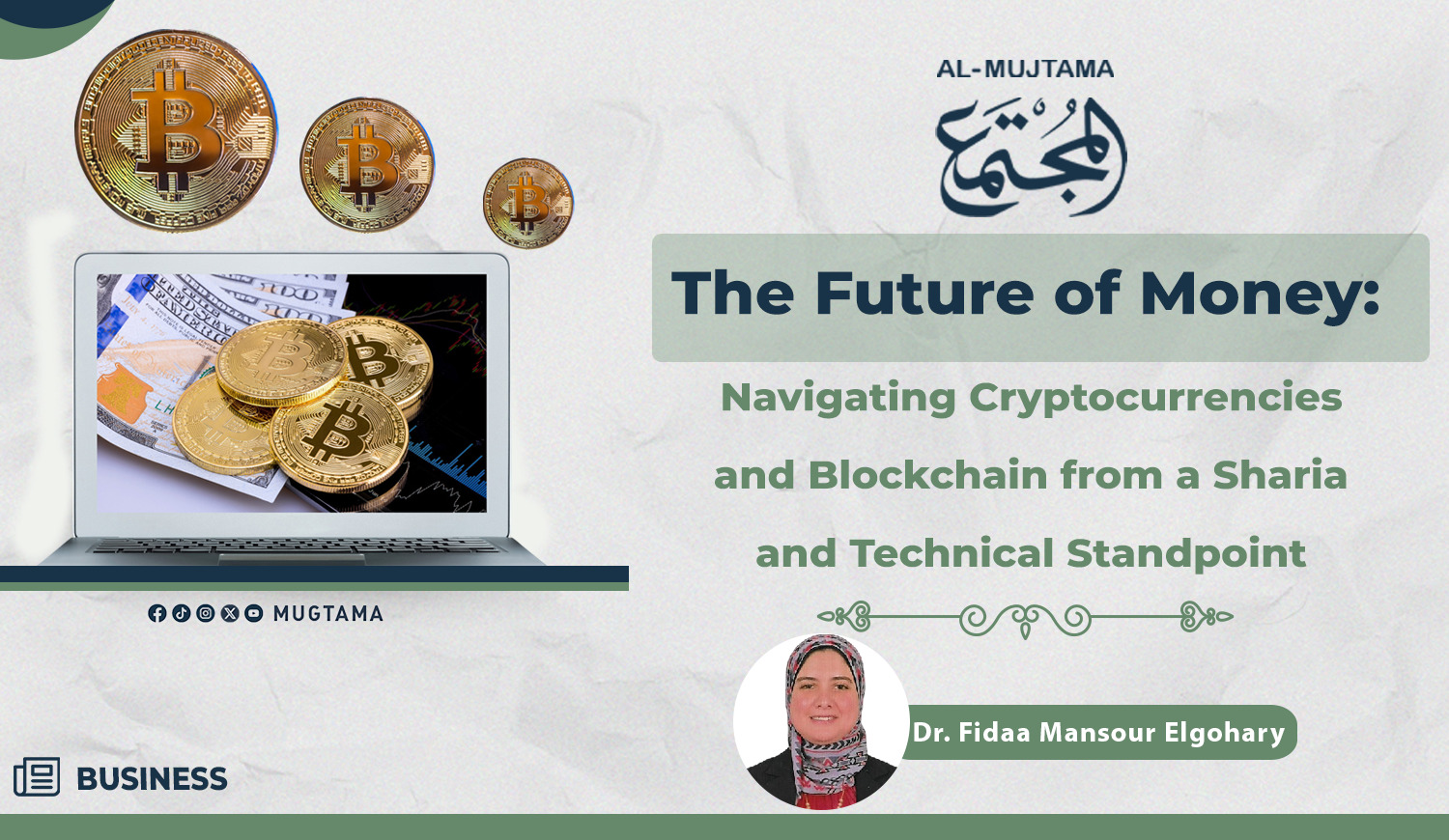The Future of Money:
Navigating Cryptocurrencies and Blockchain from a Sharia and Technical Standpoint

Amidst the accelerating technological transformations the
world is witnessing, the concept of digital cryptocurrencies and blockchain
technology stands out as a driving force reshaping the global financial
system. These concepts are no longer marginal trends; they have become an
influential reality, raising questions about the future of financial transactions,
the role of central banks, and even the concept of trust in the digital
economy.
In this article, we review the latest developments in this
world and their potential impact on the global financial system, focusing on
the associated regulatory and sharia challenges.
Evolution of the Digital Currency World
Recent years have seen tremendous developments in the field
of digital cryptocurrencies. Following the strong emergence of Bitcoin
in 2009 (as the first cryptocurrency), thousands of other digital currencies
such as Ethereum and Ripple have appeared, each with its
characteristics and uses. It is no longer limited to merely a means of digital
payment but has extended to include new concepts such as:
- Decentralized
Finance (DeFi): This system aims to build open and transparent
alternatives to traditional financial services, allowing access to
financial services (such as loans or trading) without the need for a bank
or an intermediary.
- Non-Fungible
Tokens (NFTs): These are digital tokens used to prove ownership of
digital content, such as a piece of art or a music clip, and they have
revolutionized the ownership of digital and artistic assets.
- Central
Bank Digital Currencies (CBDCs): These are attempts by governments to
develop digital versions of their official currencies, such as the digital
yuan in China or the digital euro in Europe, representing official
recognition of the potential of this technology.
Sharia Perspective on Digital Currencies
With the expansion of digital currency types, sharia questions
about their legitimacy intertwine, as the ruling differs according to the
nature of each. For traditional cryptocurrencies like Bitcoin,
jurisprudential debate revolves around considering it legitimate wealth and the
resulting rulings. Some jurists permit dealing with it if its value stabilizes
and it becomes a medium of exchange, while others prohibit it due to its lack
of currency characteristics and monetary functions, in addition to its
involvement in excessive gharar (uncertainty), jahalah (ignorance),
and high risks that may amount to gambling (maysir).
As for Decentralized Finance (DeFi), it can open
horizons for developing Sharia-compliant financial solutions, especially if its
applications are built on partnership and mudarabah contracts, away from
usurious interest and prohibited practices. Similarly, for Non-Fungible
Tokens (NFTs), their Sharia ruling is closely linked to the content they
represent. Dealing with them is permissible if the content is lawful and does
not violate Sharia and represents real ownership, and it is prohibited if the
content is forbidden or if they are merely a means of gambling.
In contrast, Central Bank Digital Currencies (CBDCs)
appear closer to Sharia acceptance because they are state-backed digital
currencies subject to regulation, which reduces potential gharar and jahalah
factors.
Blockchain Technology: The Foundation of the Digital
Revolution
Blockchain technology is the core of
cryptocurrencies. It is simply a decentralized database or digital ledger based
on a chain of "blocks" containing data and transactions that are
verified, encrypted, and permanently added to a continuous and tamper-proof
chain, much like a global ledger that uses the highest level of encryption.
Once a transaction is recorded in a block, it becomes an integral part of the
chain, making it difficult to manipulate. What distinguishes this technology
is:
- Decentralization:
The decentralized nature of digital currencies weakens the role of
traditional financial institutions as intermediaries, reducing costs and
increasing efficiency and speed.
- Security:
Digital currencies use advanced encryption technologies to ensure the
security and anonymity of transactions.
- Transparency:
Digital currency transaction records are stored on a publicly available
blockchain, which increases transaction transparency.
The use of blockchain is no longer limited to digital
currencies; it has extended to various applications in many fields, such as
supply chain management, intellectual property protection, electronic voting,
and healthcare, indicating the enormous potential of this technology to change
many industries.
From a Sharia perspective, there is no problem with blockchain
technology itself as a technology for recording, storing, and securing
data. It is a neutral tool, and the decentralization and transparency it
provides may align with Sharia principles in contracts and transactions that
require clarity and prevention of gharar, especially if used in permissible
applications and adhering to controls.
Potential Impact on the Global Financial System
The rise of cryptocurrencies and blockchain
technology carries transformative potential for the global financial
system. These technologies can provide more efficient and inclusive
alternatives to traditional financial services, such as providing financial
services without banks, especially for underserved populations, as anyone can
access financial services directly from their phone. They can also facilitate
cross-border payments, reduce their costs, improve execution speed, and enhance
transparency and security in financial transactions, given that all transactions
are recorded and traceable.
Additionally, decentralized finance can restructure
some aspects of the financial system and innovate new financial instruments
through lending and investment platforms built on blockchain.
Some countries have begun to react to these changes,
including some Arab countries that are considering launching their own digital
currencies and attempting to regulate them instead of resisting them, by
adopting central bank digital currencies to protect their economies and citizens,
and as a means of controlling the digital economy.
Regulatory, Security, and Sharia Challenges
Despite the promising potential, cryptocurrencies and
blockchain technology face significant challenges, especially on the
regulatory and security fronts. The regulatory framework for these technologies
is still evolving in most countries worldwide, creating uncertainty and opening
the door to risks. This is in addition to the absence of laws; many countries
have not yet enacted laws regulating the use of digital currencies, protecting
investors, or preventing the use of these technologies in illegal activities
such as money laundering, without stifling innovation.
On the security front, despite the strength of blockchain
technology, digital currencies remain vulnerable to hacking and
cyberattacks. Also, losing a private key or falling victim to fraud can lead to
complete loss of funds. Therefore, enhancing cybersecurity and
developing effective user protection mechanisms is a top priority.
On the Sharia side, the lack of clear regulation for
cryptocurrencies raises significant Sharia concerns, especially regarding gharar
and unjustified risks. Sharp price fluctuations, the absence of a regulatory
body, and exposure to fraud all make investing in them fraught with risks that
may reach the point of prohibition in some cases. Furthermore, their potential
use in money laundering and terrorist financing makes them subject to Sharia
prohibition, as Sharia prohibits anything that leads to corruption or harms
society.
Arab Countries' Stance on Cryptocurrencies
The stances of Arab countries have varied significantly on
the regulatory front, reflecting the different Sharia fatwas issued by
religious bodies. While some countries, such as Saudi Arabia and Egypt, have
imposed strict restrictions or bans on cryptocurrencies due to their Sharia
risks of gharar and jahalah, and their potential risks to financial stability
and investor security, other countries like the UAE and Bahrain have begun
exploring regulatory frameworks for cryptocurrencies and blockchain technology
based on permissible opinions, and even working to adopt them in specific
areas. This reflects a divergence in visions and a cautious approach to dealing
with these technologies.
Cryptocurrencies and blockchain technology represent a qualitative leap in the form of the global financial system, between promises of facilitating transactions and enhancing financial inclusion, and concerns related to regulation and security. Dealing with them from a Sharia perspective requires extreme caution. Individuals and financial institutions must verify the Sharia aspects of each application and avoid anything that involves gharar or leads to what is prohibited. Establishing a clear and strict regulatory framework, consistent with the principles of Islamic Sharia, will help utilize these technologies to build a more just and transparent financial system.
________________________
(1) OECD (2022). Crypto-Assets:
Key developments, regulatory concerns and responses. Available from:
https://www.europarl.europa.eu/RegData/etudes/STUD/2020/648779/IPOL_STU(2020)648779_EN.pdf
(2) بيومي، عبد الناصر حمدان، (بدون تاريخ)، العملات
الرقمية المشفرة في ضوء عقود المعاملات الشرعية: الحكم الشرعي وتحرير محل النزاع.
منتدى البركة للاقتصاد الإسلامي. تم الاسترجاع من: https://forum.albaraka.site/العملات-الرقمية-المشفرة-في-ضوء-عقود-ال-6/
(3) مرزوق، آمال. (2021). تقنية البلوكتشين وتطبيقاتها
الاقتصادية. مجلة الشرق الأوسط للعلوم الإنسانية والثقافية، 1(5)، 302–312. https://www.researchgate.net/publication/367185119_tqnyt_alblwktshyn_wttbyqatha_alaqtsadyt
(4) Wang, Y. (2024). The impact
of digital currencies on the financial system and the social economy.
International Journal of Global Economics and Management, 4(2). Available from:
https://www.researchgate.net/publication/384430735_The_Impact_of_Digital_Currencies_on_the_Financial_System_and_the_Social_Economy
(5) Schwarz, N., Chen, K., Poh, K., Jackson, G., Kao,
K., Fernando, F., & Markevych, M. (2021). Virtual assets and
anti-money laundering and combating the financing of terrorism (1): Some legal
and practical considerations (Fintech Note No. 2021/002). International
Monetary Fund.
https://www.imf.org/en/Publications/fintech-notes/Issues/2021/10/01/Virtual-Assets-and-Anti-Money-Laundering-and-Combating-the-Financing-of-Terrorism-1-465899











